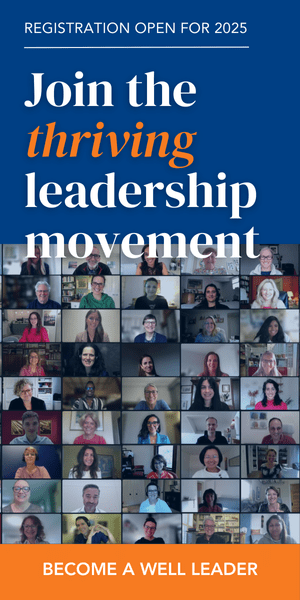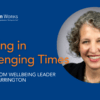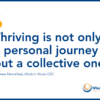 Author Karen Flanders joined Wisdom Works in 2012 as Sustainability Practice Leader. This is her first blog for Wellbeing + Strategy.
Author Karen Flanders joined Wisdom Works in 2012 as Sustainability Practice Leader. This is her first blog for Wellbeing + Strategy.
It is a privilege and a pleasure for me to be associated with Wisdom Works for so many reasons. For starters, embracing the concept of wellbeing stretches and improves my thinking on a daily basis. As I sit at my breakfast table with my New York Times, what emerges for me today is that the world is in need of a new vision: one that can make the concept of sustainability real for more people and that can provide the nations of the world with a new sense of wellbeing and common ground. For my first Wisdom Works blog, I wanted to frame Rio+20‘s sustainability agenda in the context of wellbeing to see what unfolds.
 Rio+20, the UN conference which launches today and marks the 20-year anniversary for the Earth Summit, focuses on two themes:
Rio+20, the UN conference which launches today and marks the 20-year anniversary for the Earth Summit, focuses on two themes:
- A green economy in the context of sustainable development and poverty eradication
- The institutional framework for sustainable development
The current overconsumption of critical resources plus growing energy and food prices require that economic models shift toward intelligent models of growth. Rio+20’s answer is the green economy; however, it focuses on the intersection between environment and economy.
A green economy will not, on its own, solve problems of inequity in incomes, access to resources, and quality of life; nor will it necessarily tackle pollution from existing industrial and environmental degradation. The goal of Rio+20, therefore, should be to create wellbeing for the planet and all who inhabit it. A vector for achieving sustainable development may be to couple green economy + wellbeing. Indeed, the rise of the green economy has been accompanied by the rise of wellbeing as a new paradigm for national progress, complete with new indicators. Countries around the world are already using these measures of wellbeing as policy tools. The measurement of wellbeing may differ in methodology depending on whether one is French, British, or Bhutanese, but within that diversity lies a clear commonality: citizens want good lives, not GDP growth per se.
So how does one link these two concepts, green economy + wellbeing, explicitly?
One could argue that the linkage was made in 1948 when the United Nations adopted the Universal Declaration of Human Rights, stating: “Everyone has the right to a standard of living adequate for the health and well-being of himself and of his family.” To combine this concept of universal wellbeing with policies for a green economy could be seen as the implementation (at last!) of ideals espoused by the UN more than sixty years ago.
Wellbeing, research now confirms, does depend on achieving a certain minimum standard of material prosperity. But growth beyond that minimum appears to actually decrease wellbeing, until it finally reaches a point where growth itself, green or otherwise, turns into unhappiness and waste. Focusing on green economy + wellbeing can help us see the differences between growth that is generative and enriching, versus growth that actually impoverishes.
Perhaps green economy + wellbeing is the much needed, new vision of sustainability that Rio+20 needs. It has the potential to describe a clear and actionable vision for sustainability at a global scale. And it asks these two important questions:
Where do we truly need growth, to ensure that happiness is at least within reach?
Where do we need to decouple growth (for example in our carbon emissions or our impact on biodiversity) if we are to ensure that all have a chance to exercise their right to wellbeing, now and in the future?
With this blog, I would like to invite the leaders of the world to also consider framing Rio+20’s sustainability agenda in the context of wellbeing, to see what unfolds …
UN Photo by Pernaca Sudhakaran ©United Nations, used with permission.







I agree! Environmental sustainability and physical and emotional health are fusing – and aspirational well-being is a higher order calling.